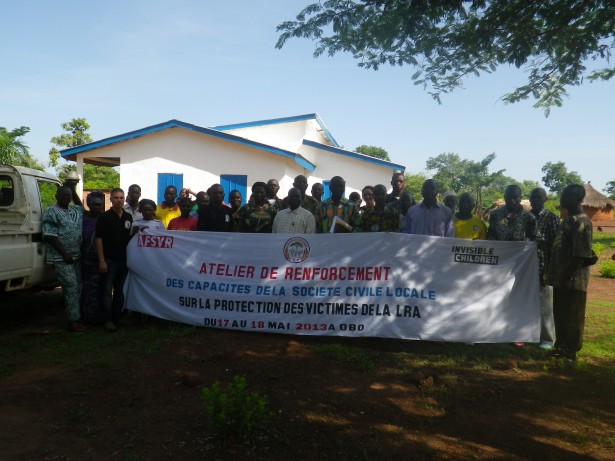In the Central African Republic (CAR), there are currently more than 25,000 people who have been directly victimized by the Lord’s Resistance Army (LRA). These individuals impacted most severely by LRA violence are legally entitled to assistance from the CAR government to help rebuild their lives. However, of those 25,000 people, only one has officially begun the process of applying for government support through the CAR judicial system. Seeking support from the government has recently become more difficult with the government takeover in CAR by an alliance of rebel groups called Seleka.
Why would thousands of people who have suffered from LRA violence not seek out government support that is rightfully theirs and desperately needed? One major reason is simply that LRA-affected communities in CAR are unaware of their legal rights.

In response to this gap in information, Invisible Children — in partnership with the Central African national NGO, Enfants Sans Frontières (ESF), and a local association, Association des Famille d’Accueil pour la Solidarités aux Victimes et Retournés (AFASVR) — conducted a two-day workshop with local administrators and civil society leaders on the judiciary rights of victims of the LRA. The goal was to help empower these local leaders with the knowledge and tools they need to advocate for their own communities and receive necessary assistance from the CAR government.
Brice Kevin Kakpayen, a lawyer from Bangui (CAR’s capital) and the coordinator of ESF, led the workshop and addressed three main questions:
Who is technically considered a “victim” of LRA violence?
What protection systems does the government of CAR currently have in place for victims of LRA violence?
What can civil society groups and local administrators do to provide judiciary support for the victims?
Brice Kakpayen emphasized the importance of trainings that address these issues, saying: “It is important that the victims are mobilized, it is their judicial right to lodge a case and obtain compensation for the injuries they have suffered.”
Additionally, the more that LRA-affected community members in CAR file their cases, the greater the documentation of the LRA’s crimes, which can ultimately be used by justice mechanisms like the International Criminal Court to effectively prosecute Joseph Kony and other ICC-indicted commanders if they are captured and stand trial.
Participants at the workshop responded very positively to the experience and urged ESF, AFASVR, and Invisible Children to reproduce the training in other towns in the LRA-affected region of the Haut-Mbomou and the Mbomou.
In addition to our Protection and Recovery programs in LRA-affected communities, Invisible Children is committed to supporting efforts like these workshops that help strengthen the ability of local communities to advocate for their own needs and keep governments accountable to protecting their citizens.
Description of AFASVR and ESF :
AFASVR (Association des Famille d’Accueil pour la Solidarités aux Victimes et Retournés | Association of Host Families for the Solidarity of Victims and Returnees): Established in 2011, the local association is based in Obo, Central African Republic (CAR). The organization supports minors, girls and boys, who come out the bush and are waiting to be transferred to their respective homes in CAR, Democratic Republic of Congo, and South Sudan.
ESF (Enfants Sans Frontières | Children Without Borders): Brice Kevin Kakpayen established ESF in May 2008. Kakpayen was part of the peace negotiations in Libreville, Gabon in January 2013 and he is now one of the fifty members of civil society advising the Central African Republic’s Transition Council. The genesis of this NGO followed Kakpayen’s research on Pygmy children in the Lobaye, a marginalized and discriminated population. EFS’s mission focuses on the protection of vulnerable populations; the headquarters are in Bangui, and the organization operates in 7 of 16 prefectures in the Central African Republic.
Think people should hear about this?